考研英语狂人95分笔记
2023考研英语完型题型解析及解题技巧

2023考研英语完型题型解析及解题技巧2023考研英语完型题型解析及解题技巧最近在看一些老电影,其中最喜欢《Forrest Gump》中的一个桥段,儿时的阿甘和珍妮被一群坏孩子欺负。
他们骑着自行车去追阿甘。
当时阿甘腿是有残疾的,要用器械辅助才能走路。
其中印象最深的一句话就是珍妮不停地对阿甘喊“Run,Forrest Gump…Run,Forrest Gump…”阿甘不停地奔跑,最终奇迹发生——这句话我也想送给大家“run,rades-in-arms.” "life was like a box of chocolates, you never know what you`re gonna get"——人生就像一盒巧克力,你永远不会知道下一颗是什么。
人生充满了未知,You are the artist that paints your future with the brush of today 重剑无锋,大巧不工完形填空是从中考、高考、四六级一起陪我们走过来的一个题型,也会继续陪伴我们考研、考博等一系列的考试,是我们所公认“老大难”的一个题型。
完形填空,顾名思义就是通过填空,让一篇不完好的文章恢复原来的模样,即考察我们的障碍式阅读。
更深一步来讲,这是由“”探究“未知”的一个过程,这也是任何一门科学、一门学问都要重视的一个技能。
我们听过无数老师这样讲,完形填空呀,分四步“读首句,把握大意”“根据上下文语境,初选答案”“复读文章,查漏补缺”“通读全文,复查答案”但我们把这些话奉为金牌法那么之后,做题的时候还是靠虚无缥缈的语感来做题。
试问,上下文的要点关键是什么?语境背后的内涵又是什么?知道答案之后来讲完形,就像知道真相后来破案,只要把正确答案讲通就行了。
金翅从小到大上过各种的英语辅导班,讲完形的老师根本都是一个套路,先把正确的选项带入原文,然后把原文翻译一遍。
但是隐藏在外表背后的原理我们却一直没有触及到,这就导致了“开始的开始我们凭语感做题,最后的最后我们靠运气得分”的困境,面对完形我们终究该何去何从?做题策略篇哲学中讲过,有运动的地方就有方法论,本文旨在提出一个观点,一个理论,把虚无缥缈的形式化、形式化、定量化的表达出来。
1995年考研英语真题及解析

徐绽老师博客:金榜教育网:1995年考研英语真题精解精析1995年全国硕士研究生入学统一考试英语试题按照《1995年全国硕士研究生入学统一考试英语考试大纲(非英语专业)》的要求命制,体现了《大纲》的考核目标、形式和内容。
该年试题题型与上一年相比,“语法结构与词汇”继续沿用相同的题型:语法选择、语法辩错题及词汇选择题;“语言知识运用”部分和“阅读部分”及“翻译”均难度适中。
SectionⅠCloze Test【文章综述】本文介绍了人们的睡眠的两个阶段——眼球快速转动并做梦的所谓快动眼睡眠REM sleep,和较长时间的非快动眼睡眠non-REM sleep。
人们对两种睡眠了解不多,但人们假定REM睡眠对大脑有某种康复功能。
non-REM sleep的作用更神秘。
【英汉对照】41.[A]Either(任一)[B]Neither(任一都不)[C]Each(每个)[D]Any(任一)42.[A]intended(打算)[B]required(要求)徐绽老师博客: 金榜教育网: [C]assumed(假定,认为)[D]inferred(推断)43.[A]subtle(微妙的)[B]obvious(明显的)[C]mysterious(神秘的)[D]doubtful(怀疑的)44.[A]maintained(保持,维持)[B]described(描述)[C]settled(解决、安顿)[D]afforded(担负得起)45.[A]in the light(根据,考虑到)[B]by virtue(凭借,由于)[C]with the exception(除了……)[D]for the purpose(为了……的目的)46.[A]reduction(减少)[B]destruction(损害)[C]deprivation(剥夺)[D]restriction(限制)47.[A]upon(一……就……,根据)[B]by(通过……方式)[C]through(通过……方式)[D]with(带着,借助)48.[A]paid attention to(注意)[B]caught sight of(看到)[C]laid emphasis on(强调,重视)[D]cast light on(阐明,说明,使人了解)49.[A]develop(发展)[B]produce(生产)[C]stimulate(刺激)[D]induce(诱导,引诱)50.[A]if(如果)[B]as if(好像,似乎)[C]only if(只有)[D]if only(要是……该多好)【核心词汇】characterize ['kærəktəraiz]v.(characterise )表示……的特性;描述……特性(character+ize 动词后缀)crash [krAF ]v.&n.碰撞,坠落,摔坏;n.失败,瓦解;爆裂声a.应急的,速成的ad.轰隆一声,哗啦一声immune [i5mjun ]a.免疫的,有免疫力的;不受影响的;豁免的(im 不+mun+e 形容词后缀)infection [in5fekFEn ]n.传染;感化(infect+ion 名词后缀)mechanism [5mekEnizEm ]n.机械装置,机构;机制,办法,途径(mechan+ism 名词后缀)【超纲词汇】bacterial [bæk'tiriəl]a.[微]细菌的fascinating ['fæsineitiŋ]a.迷人的;吸引人的;使人神魂颠倒的restorative [ri5stC:rEtiv ]n.[药]恢复药,滋补剂a.滋补的,有助于复元的;恢复健康的so-called a.所谓的;号称的【常用词组】fatal to 对……是致命的non-REM sleep 非快速动眼睡眠徐绽老师博客:金榜教育网:【答案与详解】41.答案→B考点→形容词辨析题解题技巧→根据上下文逻辑和词义。
2021考研英语讲义 lesson8. The age of rage:are we really living in the angrier times?(1)

8. The age of rage:are we really living in the angrier times?The best data we have suggests that, overall, we are indeed getting angrier. Last year, 22% of respondents around the world told the Gallup organisation they felt angry, a record since the question was first asked in 2006. And something else, even harder to measure, feels like it’s different as well: it’s as though our anger has curdled, gone rancid. As a society, we seem not to express it and move on, but to stew in it – until, at the extremes, it hardens into violence and hate.Because the effects of anger are sometimes so appalling, it’s easy to conclude that anger is inherently bad in itself – with occasional exceptions, perhaps, for major social transformations, like the fight for women’s suffrage, or the US civil rights movement. But studies have consistently shown that even everyday anger – not campaigns against injustice, but snappy remarks over the dinner table – usually has positive results. Pioneering work in the 1970s by the American researcher James Averill, confirmed in the years since, found that nonviolent expressions of anger generally helped people understand each other better, and to cooperate more successfully. For example, when an angry teenager shouted about his curfew, his parents agreed to modifications – as long as the teen promised to improve his grades.In evolutionary terms, this makes sense. An emotion as widespread and ancient as anger doesn’t persist by accident, but serves a clear purpose: to protect boundaries, deter threats, and make it a less appealing prospect to injure or exploit you – to make the target of anger “less willing to impose costs and more willing to tolerate costs”, in the words of the psychologist Aaron Sell. It provides a feeling of control, and the motivation to take the necessary actions in order to assert that control – as when it helps a shouty teenager negotiate more freedom from his parents.But the crucial point about these productive outbursts is that there was an obvious route for translating anger into action, and thus reaching resolution. By contrast, we’ve built a world that’s extremely good at generating causes for anger, but extremely bad at giving us anything constructive to do with it. We live in densersettlements, and thus more frequently get each other’s backs up – but our gripes are usually with strangers, which means there’s no pre-existing relationship to discuss and recalibrate.We face big, systemic forces that threaten our wellbeing – automation, globalisation and above all climate change – but that offer few ways for individual people or communities to turn their anger into change. Incidentally, this also explains why “venting” your anger, by punching a pillow or suchlike, doesn’t work, and can even make things worse. That old advice is based on the assumption that emotions simply need release. But anger isn’t trapped wind. It doesn’t need somewhere to go. It needs something to do.Social media, it almost doesn’t need saying, is where this problem reaches its extreme. The algorithms of the attention economy relentlessly expose us to enraging stories and opinions, for the straightforward reason that anger spreads more virally than other emotions – so you’re more likely to click, like, share and stay glued to Twitter or Facebook when you’re furious.That certainly doesn’t mean anger is always, or even often, justifiable. The philosopher Martha Nussbaum has argued that it’s almost never justifiable, because the desire for payback, which lies at the heart of anger, is fundamentally irrational. Getting angry about mistreatment, yours or someone else’s, doesn’t turn the clock back and magically reduce the mistreatment. (It might dissuade future wrongdoing, of course; but the sheer fact of making the culprit suffer achieves nothing.) This is a useful perspective, not because any of us could hope to become perfectly rational, but because one way to take the edge off your own anger is to ask yourself if it’s actually going to help the situation you’re angry about. In this, Nussbaum’s stance complements rather than contradicts those who argue that anger is useful; they all agree that what counts is constructive action. If you want to assuage your own anger, or other people’s anger, or the destructive effects of anger in the world at large, the only meaningful course is to do something concrete, however modest, in ways that will improve the situation, rather than fueling the cycle of anger.。
考研英语1995-阅读真题_全文翻译
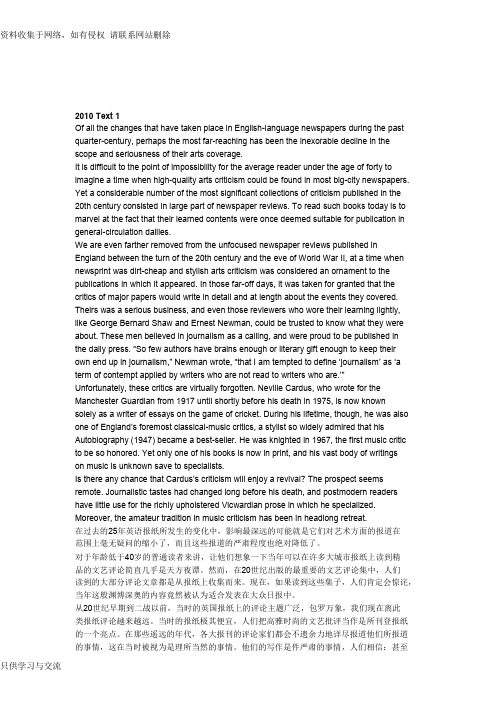
资料收集于网络,如有侵权请联系网站删除2010 Text 1Of all the changes that have taken place in English-language newspapers during the past quarter-century, perhaps the most far-reaching has been the inexorable decline in the scope and seriousness of their arts coverage.It is difficult to the point of impossibility for the average reader under the age of forty to imagine a time when high-quality arts criticism could be found in most big-city newspapers. Yet a considerable number of the most significant collections of criticism published in the20th century consisted in large part of newspaper reviews. To read such books today is to marvel at the fact that their learned contents were once deemed suitable for publication in general-circulation dailies.We are even farther removed from the unfocused newspaper reviews published in England between the turn of the 20th century and the eve of World War II, at a time when newsprint was dirt-cheap and stylish arts criticism was considered an ornament to the publications in which it appeared. In those far-off days, it was taken for granted that the critics of major papers would write in detail and at length about the events they covered. Theirs was a serious business, and even those reviewers who wore their learning lightly, like George Bernard Shaw and Ernest Newman, could be trusted to know what they were about. These men believed in journalism as a calling, and were proud to be published inthe daily press. “So few authors have brains enough or literary gift enough to keep their own end up in journalism,” Newman wrote, “that I am tempted to define ‘journalism’ as ‘a term of contempt applied by writers who are not read to writers who are.’”Unfortunately, these critics are virtually forgotten. Neville Cardus, who wrote for the Manchester Guardian from 1917 until shortly before his death in 1975, is now knownsolely as a writer of essays on the game of cricket. During his lifetime, though, he was also one of England’s foremost classical-music critics, a stylist so widely admired that his Autobiography (1947) became a best-seller. He was knighted in 1967, the first music critic to be so honored. Yet only one of his books is now in print, and his vast body of writingson music is unknown save to specialists.Is there any chance that Cardus’s criticism will enjoy a revival? The prospect seems remote. Journalistic tastes had changed long before his death, and postmodern readers have little use for the richly upholstered Vicwardian prose in which he specialized. Moreover, the amateur tradition in music criticism has been in headlong retreat.在过去的25年英语报纸所发生的变化中,影响最深远的可能就是它们对艺术方面的报道在范围上毫无疑问的缩小了,而且这些报道的严肃程度也绝对降低了。
1995年考研英语阅读解析

1995年考研英语阅读解析In 1995, the Graduate Record Examinations (GRE) were a pivotal moment for many aspiring scholars in the United States. The English section of the GRE, in particular, was known for its rigorous reading comprehension component, which tested the candidates' ability to understand complex texts and answer questions based on them.The 1995 GRE English reading section featured a variety of passages that covered diverse topics, from scientific research to literary analysis. These passages were often drawn from academic journals, newspapers, and other sources that were considered to be of high intellectual merit. The questions that followed these passages were designed to assess the test-takers' comprehension, inference, andcritical thinking skills.One common type of question in the 1995 GRE English reading section was the main idea question. These questions required test-takers to identify the central theme or argument of a passage. To answer such questions correctly, candidates needed to have a thorough understanding of the passage and be able to distinguish between the main points and supporting details.Another type of question that appeared frequently was inference questions. These required test-takers to make logical deductions based on the information presented in thepassage. Inference questions tested the ability to read between the lines and understand the implications of the author's statements.Vocabulary questions were also a part of the 1995 GRE English reading section. These questions tested the candidates' knowledge of advanced vocabulary and theirability to understand the meaning of words in context. To excel in this area, test-takers needed to have a robust vocabulary and be able to quickly discern the meaning of unfamiliar words based on the context in which they appeared.Lastly, the reading section included questions that tested the ability to analyze the structure of a text. These questions might ask about the author's purpose, the organization of the passage, or the effectiveness of certain rhetorical devices. Answering these questions correctly required a deep understanding of the text and the ability to analyze it critically.In summary, the 1995 GRE English reading section was a comprehensive test of a candidate's ability to read and understand complex texts. It required a combination of strong vocabulary, critical thinking, and analytical skills. Those who performed well in this section demonstrated their readiness for the demands of graduate-level academic work.。
唐叔考研英语阅读笔记
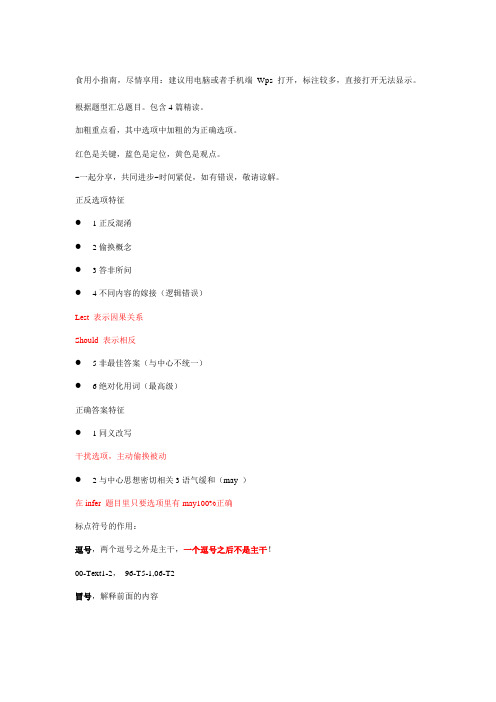
食用小指南,尽情享用:建议用电脑或者手机端Wps打开,标注较多,直接打开无法显示。
根据题型汇总题目。
包含4篇精读。
加粗重点看,其中选项中加粗的为正确选项。
红色是关键,蓝色是定位,黄色是观点。
~一起分享,共同进步~时间紧促,如有错误,敬请谅解。
正反选项特征●1正反混淆●2偷换概念●3答非所问●4不同内容的嫁接(逻辑错误)Lest 表示因果关系Should 表示相反●5非最佳答案(与中心不统一)●6绝对化用词(最高级)正确答案特征●1同义改写干扰选项,主动偷换被动●2与中心思想密切相关3语气缓和(may )在infer 题目里只要选项里有may100%正确标点符号的作用:逗号,两个逗号之外是主干,一个逗号之后不是主干!00-Text1-2,96-T5-1,06-T2冒号,解释前面的内容97-T3-t60We live in a society in which the medicinal and social use of substances (drugs) is pervasive: (=)an aspirin to quiet a headache, some wine to be sociable, coffee to get going in the morning, a cigarette for the nerves. When do these socially…..60. The word “pervasive” (Line 1, Paragraph 2) might mean ________.[A] widespread [B] overwhelming[C] piercing [D] fashionable07-T4-t36-para1It never rains but it pours. Just as bosses and boards have finally sorted out their worst accounting and compliance troubles, and improved their feeble corporation governance, a new problem threatens to earn them –especially in America –the sort of nasty headlines that inevitably lead to heads rolling in the executive suite: (=)data insecurity. Left, until now, to odd,low-level IT staff to put right, and seen as a concern only of data-rich industries such as banking, telecoms and air travel, information protection is now high on the boss’s agenda in businesses of every variety.36. The statement “It never rains but it pours” is used to introduce[A] the fierce business competition. [B] the feeble boss-board relations.[C] the threat from news reports.[D] the severity of data leakage.分号,前后为并列关系,画等号03-T4-Para2 Death is normal;(=) we are genetically programmed to disintegrate and perish, even under ideal conditions. We all understand that at some level, yet as medical consumers we treat death as a problem to be solved.97-T5-Para3I t is also less than most forecasters had predicted. In late 1994 the panel of economists which The Economist polls each month said that America’s inflation rate would average 3.5% in 1995. In fact, it fell to 2.6% in August, and is expected to average only about 3% for the year as a whole. In Britain and Japan inflation is running half a percentage point below the rate predicted at the end of last year. This is no flash in the pan;(=)over the past couple of years, inflation has been consistently lower than expected in Britain and America.例证题(蓝色表示定位,黄色是观点)标志:example case illustrate demonstrate to show 例子本身不重要,例子前后观点最重要!干扰选项就是例子本身99.T5.t67 Science, in practice, depends far less on the experiments it prepares than on the preparedness of the minds of the men who watch the experiments. Sir Isaac Newton supposedly discovered gravitythrough the fall of an apple. Apples had been falling in many places for centuries and thousands of people had seen them fall. But Newton for years had been curious about the cause of the orbital motion of the moon and planets. What kept them in place? Why didn’t they fall out of the sky? The fact that the apple fell down toward the earth and not up into the tree answered the question he had been asking himself about those larger fruits of the heavens, the moon and the planets.. The author wants to prove with the example of Isaac Newton that ________.[A] inquiring minds are more important than scientific experiments[B] science advances when fruitful researches are conducted[C] scientists seldom forget the essential nature of research[D] unpredictability weighs less than prediction in scientific research01.T2.t57 To take advantage of this tool, some impoverished countries will have to get over their outdated anti-colonial prejudices with respect to foreign investment. Countries that still think foreign investment is an invasion of their sovereignty might well study the history of infrastructure (the basic structural foundations of a society) in the United States. When the United States built its industrial infrastructure, it didn’t have the capital to do so. And that is why America’s Second Wave infrastructure -- including roads, harbors, highways, ports and so on -- were built with foreign investment. The English, the Germans, the Dutch and the French were investing in Britain’s former colony. They financed them. Immigrant Americans built them. Guess who owns them now? The Americans.57. The writer mentioned the case of the United States to justify the policy of ________.[A] providing financial support overseas[B] preventing foreign capital’s control[C] building industrial infrastructure [D] accepting foreign investment00.T2.t56 Where is another way to commit evolutionary suicide: stay alive, but have fewer children. Few people are as fertile as in the past. Except in some religious communities, very few women have 15 children. Nowadays the number of births, like the age of death, has become average. Most of us have roughly the same number of offspring. Again, differences between people and the opportunity for natural selection to take advantage of it have diminished. India shows what is happening. The country offers wealth for a few in the great cities and poverty for the remaining tribal peoples. The grand mediocrity of today -- everyone being the same in survival and number of offspring -- means that natural selection has lost 80% of its power in upper-middle-class India compared to the tribes56 What does the example of India illustrate?[A] Wealthy people tend to have fewer children than poor people.[B] Natural selection hardly works among the rich and the poor.[C] The middle class population is 80% smaller than that of the tribes.[D] India is one of the countries with a very high birth rate.To paraphrase 18th-century statesman Edmund Burke, “all that is needed for the triumph of a misguided cause is that good people do nothing.” One such cause now seeks to end biomedical research because of the theory that animals have rights ruling out their use in research. Scientists need to respond forcefully to animal rights advocates(情态动词表示作者观点), whose arguments are confusing the public and thereby threatening advances in health knowledge and care. Leaders of the animal rights movement target biomedical research because it depends on public funding, and few people understand the process of health care research. Hearing allegations of cruelty to animals in research settings, many are perplexed that anyone would deliberately harm an animal46. The author begins his article with Edmund Burke’s words to ________.[A] call on scientists to take some actions[B] criticize the misguided cause of animal rights[C] warn of the doom of biomedical research[D] show the triumph of the animal rights movementFor example, a grandmotherly woman staffing an animal rights booth at a recent street fair was distributing a brochure that encouraged readers not to use anything that comes from or is tested in animals—no meat, no fur, no medicines. Asked if she opposed immunizations, she wanted to know if vaccines come from animal research. When assured that they do, she replied, “Then I would have to say yes.” Asked what will happen when epidemics return, she said, “Don’t worry, scientists will find some way of using computers.” Such well-meaning people just don’t understandt4848. The example of the grandmotherly woman is used to show the public’s ________.[A] discontent with animal research[B] ignorance about medical science(ignorance~don’t understand~反复出现)[C] indifference to epidemics[D] anxiety about animal rights06T01t4 例子A yet观点B(AB相反)Rodriguez notes that children in remote villages around the world are fans of superstars like Arnold Schwarzenegger and Garth Brooks,(A)yet(B)“some Americans fear that immigrants living within the United States remain somehow immune to the nation’s assimilative power.”(B:移民对国家的同化力量免疫=国家的同化力量弱(Yet,说明应该与A事实相反)倒推A:(国家力量强大)=选项D)24. Why are Arnold Schwarzenegger and Garth Brooks mentioned in Paragraph 5?[A] To prove their popularity around the world.[B] To reveal the public’s fear of immigrants.[C] To give examples of successful immigrants.[D] To show the powerful influence of American culture.52, was nearly toothless. So he hired a dentist to transplant nine teeth into his jaw – having extracted them from the mouths of his slaves.That’s a far different image from the cherry-tree-chopping George most people remember from their history books(A)。
考研英语翻译解密技巧资料108篇要点笔记解析
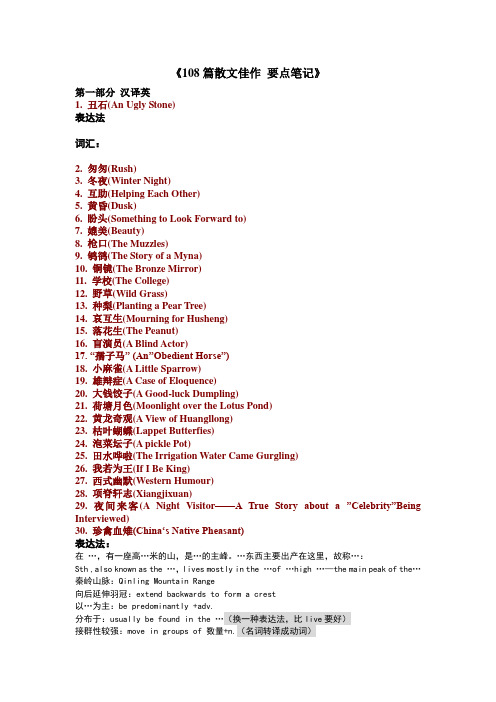
《108篇散文佳作要点笔记》第一部分汉译英1. 丑石(An Ugly Stone)表达法词汇:2. 匆匆(Rush)3. 冬夜(Winter Night)4. 互助(Helping Each Other)5. 黄昏(Dusk)6. 盼头(Something to Look Forward to)7. 媲美(Beauty)8. 枪口(The Muzzles)9. 鸲鹆(The Story of a Myna)10. 铜镜(The Bronze Mirror)11. 学校(The College)12. 野草(Wild Grass)13. 种梨(Planting a Pear Tree)14. 哀互生(Mourning for Husheng)15. 落花生(The Peanut)16. 盲演员(A Blind Actor)17. “孺子马” (An”Obedient Horse”)18. 小麻雀(A Little Sparrow)19. 雄辩症(A Case of Eloquence)20. 大钱饺子(A Good-luck Dumpling)21. 荷塘月色(Moonlight over the Lotus Pond)22. 黄龙奇观(A View of Huangllong)23. 枯叶蝴蝶(Lappet Butterfies)24. 泡菜坛子(A pickle Pot)25. 田水哗啦(The Irrigation Water Came Gurgling)26. 我若为王(If I Be King)27. 西式幽默(Western Humour)28. 项脊轩志(Xiangjixuan)29. 夜间来客(A Night Visitor——A True Story about a ”Celebrity”Being Interviewed)30. 珍禽血雉(China…s Native Pheasant)表达法:在…,有一座高…米的山,是…的主峰。
张雪峰提分笔记
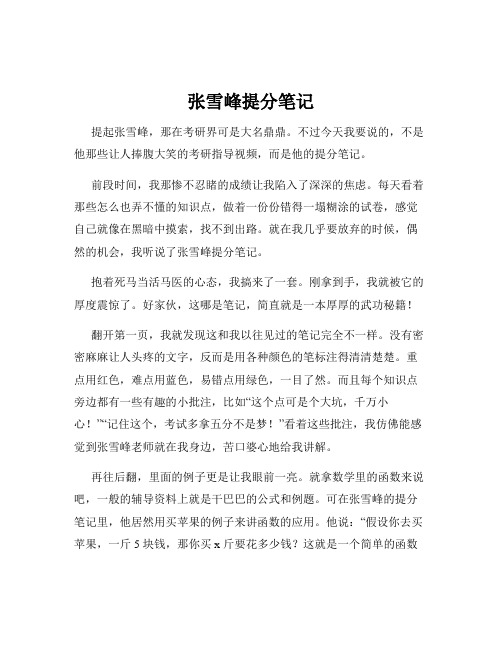
张雪峰提分笔记提起张雪峰,那在考研界可是大名鼎鼎。
不过今天我要说的,不是他那些让人捧腹大笑的考研指导视频,而是他的提分笔记。
前段时间,我那惨不忍睹的成绩让我陷入了深深的焦虑。
每天看着那些怎么也弄不懂的知识点,做着一份份错得一塌糊涂的试卷,感觉自己就像在黑暗中摸索,找不到出路。
就在我几乎要放弃的时候,偶然的机会,我听说了张雪峰提分笔记。
抱着死马当活马医的心态,我搞来了一套。
刚拿到手,我就被它的厚度震惊了。
好家伙,这哪是笔记,简直就是一本厚厚的武功秘籍!翻开第一页,我就发现这和我以往见过的笔记完全不一样。
没有密密麻麻让人头疼的文字,反而是用各种颜色的笔标注得清清楚楚。
重点用红色,难点用蓝色,易错点用绿色,一目了然。
而且每个知识点旁边都有一些有趣的小批注,比如“这个点可是个大坑,千万小心!”“记住这个,考试多拿五分不是梦!”看着这些批注,我仿佛能感觉到张雪峰老师就在我身边,苦口婆心地给我讲解。
再往后翻,里面的例子更是让我眼前一亮。
就拿数学里的函数来说吧,一般的辅导资料上就是干巴巴的公式和例题。
可在张雪峰的提分笔记里,他居然用买苹果的例子来讲函数的应用。
他说:“假设你去买苹果,一斤 5 块钱,那你买 x 斤要花多少钱?这就是一个简单的函数关系式啊!”这么一解释,原本抽象的函数瞬间变得生动有趣起来,我一下子就明白了。
还有英语,张雪峰老师把那些复杂的语法规则编成了一个个有趣的小故事。
比如讲定语从句的时候,他说:“那个穿红衣服的女孩是我的同学。
这里‘穿红衣服的’就是定语从句,用来修饰女孩。
”然后还配了一幅搞笑的漫画,画着一个穿红衣服的女孩,旁边写着“定语从句在此”。
看着这样的笔记,我忍不住笑出声来,同时也把知识点深深地记在了脑子里。
不仅如此,笔记里还有很多实用的小技巧。
比如做阅读理解的时候,先看题目再读文章;写作文的时候,开头一定要吸引人。
这些技巧虽然简单,但是真的很管用。
我按照笔记里的方法开始学习,每天都沉浸在其中。
张雪峰英语提分笔记
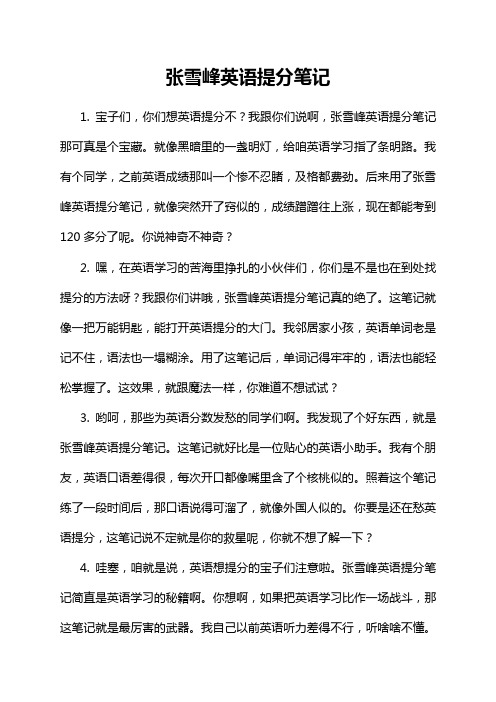
张雪峰英语提分笔记1. 宝子们,你们想英语提分不?我跟你们说啊,张雪峰英语提分笔记那可真是个宝藏。
就像黑暗里的一盏明灯,给咱英语学习指了条明路。
我有个同学,之前英语成绩那叫一个惨不忍睹,及格都费劲。
后来用了张雪峰英语提分笔记,就像突然开了窍似的,成绩蹭蹭往上涨,现在都能考到120多分了呢。
你说神奇不神奇?2. 嘿,在英语学习的苦海里挣扎的小伙伴们,你们是不是也在到处找提分的方法呀?我跟你们讲哦,张雪峰英语提分笔记真的绝了。
这笔记就像一把万能钥匙,能打开英语提分的大门。
我邻居家小孩,英语单词老是记不住,语法也一塌糊涂。
用了这笔记后,单词记得牢牢的,语法也能轻松掌握了。
这效果,就跟魔法一样,你难道不想试试?3. 哟呵,那些为英语分数发愁的同学们啊。
我发现了个好东西,就是张雪峰英语提分笔记。
这笔记就好比是一位贴心的英语小助手。
我有个朋友,英语口语差得很,每次开口都像嘴里含了个核桃似的。
照着这个笔记练了一段时间后,那口语说得可溜了,就像外国人似的。
你要是还在愁英语提分,这笔记说不定就是你的救星呢,你就不想了解一下?4. 哇塞,咱就是说,英语想提分的宝子们注意啦。
张雪峰英语提分笔记简直是英语学习的秘籍啊。
你想啊,如果把英语学习比作一场战斗,那这笔记就是最厉害的武器。
我自己以前英语听力差得不行,听啥啥不懂。
用了这笔记后,听力就像开了顺风耳一样,成绩提高了不少呢。
这么好的东西,你舍得错过吗?5. 嗨呀,英语提分咋就这么难呢?不过别怕,张雪峰英语提分笔记来救场啦。
这笔记就像一个知识的宝库,啥英语学习的好方法都在里面藏着。
我表弟英语写作老是词不达意,得分超低。
自从用了这个笔记,写作水平像坐火箭一样上升,老师都夸他进步大呢。
你要是也想在英语上打个翻身仗,这笔记可不能不看啊,对吧?6. 哎呀,各位英语学习者,你们知道吗?张雪峰英语提分笔记那可是相当厉害。
就好像是一个超级导航仪,能把你在英语学习的迷宫里带出来。
我班上有个同学,英语阅读做得超慢,还错很多。
考研英语历年阅读理解真题精析--1995年part5
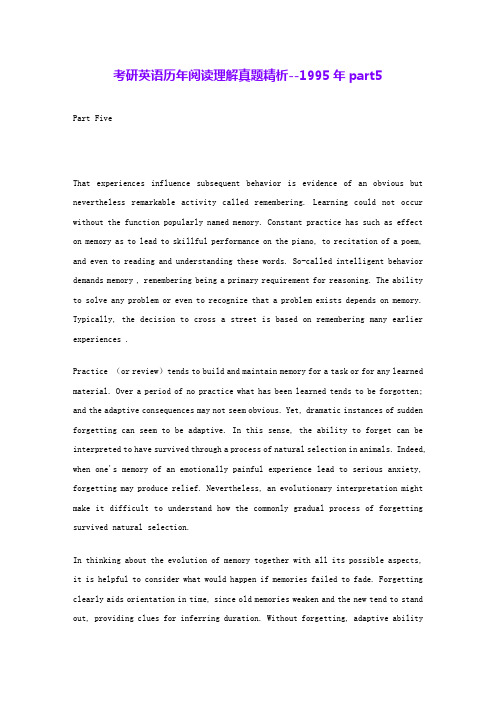
考研英语历年阅读理解真题精析--1995年part5Part FiveThat experiences influence subsequent behavior is evidence of an obvious but nevertheless remarkable activity called remembering. Learning could not occur without the function popularly named memory. Constant practice has such as effect on memory as to lead to skillful performance on the piano, to recitation of a poem, and even to reading and understanding these words. So-called intelligent behavior demands memory , remembering being a primary requirement for reasoning. The ability to solve any problem or even to recognize that a problem exists depends on memory. Typically, the decision to cross a street is based on remembering many earlier experiences .Practice (or review)tends to build and maintain memory for a task or for any learned material. Over a period of no practice what has been learned tends to be forgotten; and the adaptive consequences may not seem obvious. Yet, dramatic instances of sudden forgetting can seem to be adaptive. In this sense, the ability to forget can be interpreted to have survived through a process of natural selection in animals. Indeed, when one's memory of an emotionally painful experience lead to serious anxiety, forgetting may produce relief. Nevertheless, an evolutionary interpretation might make it difficult to understand how the commonly gradual process of forgetting survived natural selection.In thinking about the evolution of memory together with all its possible aspects, it is helpful to consider what would happen if memories failed to fade. Forgetting clearly aids orientation in time, since old memories weaken and the new tend to stand out, providing clues for inferring duration. Without forgetting, adaptive abilitywould suffer, for example ,learned behavior that might have been correct a decade ago may no longer be. Cases are recorded of people who (by ordinary standards)forgot so little that their everyday activities were full of confusion. This forgetting seems to serve that survival of the individual and the species.Another line of thought assumes a memory storage system of limited capacity that provides adaptive flexibility specifically through forgetting. In this view, continual adjustments are made between learning or memory storage ( input)and forgetting (output). Indeed, there is evidence that the rate at which individuals forget is directly related to how much they have learned. Such data offers gross support of contemporary models of memory that assume an input-output balance.17. From the evolutionary point of view,__.(A)forgetting for lack of practice tends to be obviously inadaptive .(B)if a person gets very forgetful all of a sudden he must be very adaptive(C)the gradual process of forgetting is an indication of an individual' s adaptability(D)sudden forgetting may bring about adaptive consequences18. According to the passage, if a person never forgot ,__.(A)he would survive best(B)he would have a lot of trouble(C)his ability to learn would be enhanced(D)the evolution of memory would stop19. From the last paragraph we know that__.(A)forgetfulness is a response to learning(B)the memory storage system is an exactly balanced input-output system(C)memory is a compensation for forgetting(D)the capacity of a memory storage system is limited because forgetting occurs20. In this article, the author tries to interpret the function of__.(A)remembering (B)forgetting(C)adapting D)experiencingUnit 2(1995)Part5重点词汇:subsequent(随后的)←sub+sequ+ent,sub-在下,sequ(=follow)词根"跟随",-ent形容词后缀。
1995年考研英语真题及解析汇报

1995年全国硕士研究生入学统一考试英语试题Section ⅠUse of EnglishSleep is divided into periods of so-called REM sleep, characterized by rapid eye movements and dreaming, and longer periods of non-REM sleep. 1 kind of sleep is at all well-understood, but REM sleep is 2 to serve some restorative function of the brain. The purpose of non-REM sleep is even more 3 . The new experiments, such as these 4 for the first time at a recent meeting of the Society for Sleep Research in Minneapolis, suggest fascinating explanations 5 of non-REM sleep.For example, it has long been known that total sleep 6 is 100 percent fatal to rats, yet, 7 _examinations of the dead bodies, the animals look completely normal.A researcher has now8 the mystery of why the animals die. The rats 9 bacterial infections of the blood, 10 their immune systems—the self-protecting mechanisrn against disease—had crashed.1. [A] Either [B] Neither [C] Each [D] Any2. [A] intended [B] required [C] assumed [D] inferred3. [A] subtle [B] obvious [C] mysterious [D] doubtful4. [A] maintained [B] described [C] settled [D] afforded5. [A] in the light [B] by virtue [C] with the exception [D] for thepurpose6. [A] reduction [B] destruction [C] deprivation [D] restriction7. [A] upon [B] by [C] through [D] with8. [A] paid attention to [B] caught sight of [C] laid emphasis on [D] cast light on9. [A] develop [B] produce [C] stimulate [D] induce10. [A] if [B] as if [C] only if [D] if only一、文章结构总体分析睡眠分为浅睡阶段和较长时间的深睡阶段。
考研英语超级精读笔记猫叔
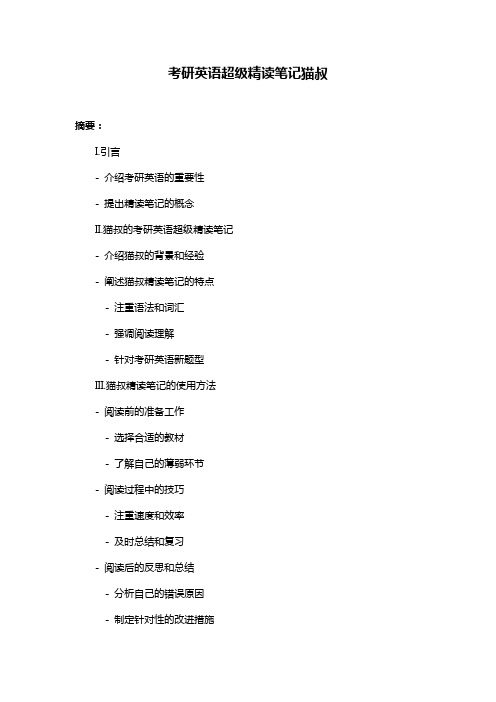
考研英语超级精读笔记猫叔摘要:I.引言- 介绍考研英语的重要性- 提出精读笔记的概念II.猫叔的考研英语超级精读笔记- 介绍猫叔的背景和经验- 阐述猫叔精读笔记的特点- 注重语法和词汇- 强调阅读理解- 针对考研英语新题型III.猫叔精读笔记的使用方法- 阅读前的准备工作- 选择合适的教材- 了解自己的薄弱环节- 阅读过程中的技巧- 注重速度和效率- 及时总结和复习- 阅读后的反思和总结- 分析自己的错误原因- 制定针对性的改进措施IV.猫叔精读笔记的效果和评价- 提高考生的阅读理解能力- 帮助考生掌握考研英语新题型- 受到广大考生的好评和认可正文:考研英语超级精读笔记猫叔随着考研英语的重要性日益凸显,越来越多的考生开始寻找有效的备考方法。
其中,精读笔记被认为是一种非常有效的学习方式。
本文将为大家介绍一位备受推崇的考研英语精读笔记专家——猫叔,以及他的超级精读笔记。
猫叔是一位有着丰富考研英语辅导经验的专家,他的精读笔记以注重语法和词汇、强调阅读理解、针对考研英语新题型而著称。
猫叔认为,语法和词汇是英语学习的基础,只有掌握了这两点,才能在考研英语中取得高分。
因此,他的精读笔记特别注重这两方面的讲解,旨在帮助考生打牢基础。
此外,猫叔的精读笔记还强调阅读理解。
他认为,阅读理解是考研英语的重要组成部分,只有通过大量阅读,才能提高阅读速度和理解能力。
因此,他的精读笔记选取了大量的真题和模拟题进行讲解,让考生在实战中提高阅读理解能力。
针对考研英语新题型,猫叔的精读笔记也给出了独特的见解。
他结合自己的辅导经验,总结出了一套应对新题型的方法和技巧,帮助考生在考试中游刃有余。
那么,如何使用猫叔的精读笔记呢?首先,考生在阅读前要进行充分的准备工作,如选择合适的教材、了解自己的薄弱环节等。
阅读过程中,要注重速度和效率,及时总结和复习所学内容。
阅读后,要反思和总结自己的阅读经历,分析错误原因,并制定针对性的改进措施。
总之,猫叔的考研英语超级精读笔记为考生提供了一种有效的备考方法。
考研英语狂人95分,阅读满分笔记(新东方范猛老师讲的2014)
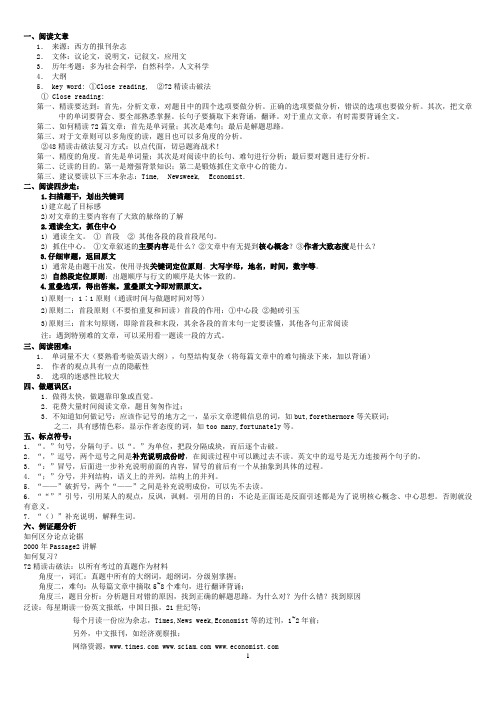
一、阅读文章1.来源:西方的报刊杂志2.文体:议论文,说明文,记叙文,应用文3.历年考题:多为社会科学,自然科学,人文科学4.大纲5.key word: ①Close reading, ②72精读击破法① Close reading:第一、精读要达到:首先,分析文章,对题目中的四个选项要做分析。
正确的选项要做分析,错误的选项也要做分析。
其次,把文章中的单词要背会、要全部熟悉掌握。
长句子要摘取下来背诵,翻译。
对于重点文章,有时需要背诵全文。
第二、如何精读72篇文章:首先是单词量;其次是难句;最后是解题思路。
第三、对于文章则可以多角度的读,题目也可以多角度的分析。
②48精读击破法复习方式:以点代面,切忌题海战术!第一、精度的角度。
首先是单词量;其次是对阅读中的长句、难句进行分析;最后要对题目进行分析。
第二、泛读的目的。
第一是增强背景知识;第二是锻炼抓住文章中心的能力。
第三、建议要读以下三本杂志:Time, Newsweek, Economist.二、阅读四步走:1.扫描题干,划出关键词1)建立起了目标感2)对文章的主要内容有了大致的脉络的了解2.通读全文,抓住中心1) 通读全文。
① 首段② 其他各段的段首段尾句。
2) 抓住中心。
①文章叙述的主要内容是什么?②文章中有无提到核心概念?③作者大致态度是什么?3.仔细审题,返回原文1) 通常是由题干出发,使用寻找关键词定位原则。
大写字母,地名,时间,数字等。
2) 自然段定位原则:出题顺序与行文的顺序是大体一致的。
4.重叠选项,得出答案。
重叠原文 即对照原文。
1)原则一:1∶1原则(通读时间与做题时间对等)2)原则二:首段原则(不要怕重复和回读)首段的作用:①中心段②抛砖引玉3)原则三:首末句原则,即除首段和末段,其余各段的首末句一定要读懂,其他各句正常阅读注:遇到特别难的文章,可以采用看一题读一段的方式。
三、阅读困难:1.单词量不大(要熟看考验英语大纲),句型结构复杂(将每篇文章中的难句摘录下来,加以背诵)2.作者的观点具有一点的隐蔽性3.选项的迷惑性比较大四、做题误区:1.做得太快,做题靠印象或直觉。
考研英语一阅读理解真题加解析1995 Passage 4

1995Passage 4 (一)Personality is to a large extent inherent — A-type parents usually bring about A-type offspring. But the environment must also have a profound effect, since if competition is important to the parents, it is likely to become a major factor in the lives of their children.One place where children soak up A characteristics is school, which is, by its very nature, a highly competitive institution. Too many schools adopt the "win at all costs" moral standard and measure their success by sporting achievements. The current passion for making children compete against their classmates or against the clock produces a two-layer system, in which competitive A-types seem in some way better than their B-type fellows. Being too keen to win can have dangerous consequences: remember that Pheidippides, the first marathon runner, dropped dead seconds after saying: "Rejoice, we conquer!"By far the worst form of competition in schools is the disproportionate emphasis on examinations. It is a rare school that allows pupils to concentrate on those things they do well. The merits of competition by examination are somewhat questionable, but competition in the certain knowledge of failure is positively harmful. Obviously, it is neither practical nor desirable that all A youngsters change into B's. The world needs types, and schools have an important duty to try to fit a child's personality to his possible future employment. It is top management.If the preoccupation of schools with academic work was lessened, more time might be spent teaching children surer values. Perhaps selection for the caring professions, especially medicine, could be made less by good grades in chemistry and more by such considerations as sensitivity and sympathy. It is surely a mistake to choose our doctors exclusively from A- type stock. B's are important and should be encouraged.63. According to the passage, A-type individuals are usually ________.[A] impatient[B] considerate[C] aggressive[D] agreeable64. The author is strongly opposed to the practice of examinations at schools because ________.[A] the pressure is too great on the students[B] some students are bound to fail[C] failure rates are too high[D] the results of examinations are doubtful65. The selection of medical professionals is currently based on ________.[A] candidates' sensitivity[B] academic achievements[C] competitive spirit[D] surer values66. From the passage we can draw the conclusion that ________.[A] the personality of a child is well established at birth[B] family influence dominates the shaping of one's characteristics[C] the development of one's personality is due to multiple factors[D] B-type characteristics can find no place in a competitive society性格在很大程度上是先天形成的——A型性格的父母会有A型性格的子女。
考研英语超级精读笔记猫叔

考研英语超级精读笔记猫叔(最新版)目录1.猫叔的考研英语超级精读笔记概述2.笔记的主要内容和价值3.猫叔的推荐网课和公众号4.猫叔的考研英语翻译笔记5.猫叔的建议和提醒正文猫叔的考研英语超级精读笔记概述猫叔的考研英语超级精读笔记是一份非常实用且详细的考研英语学习资料。
这份笔记是猫叔在准备考研过程中自己整理出来的,不仅参考了教材的讲解,还融入了自己的做题方法和经验。
猫叔的笔记涵盖了考研英语的各个方面,从词汇到语法,从阅读理解到写作,都有详细的讲解和实例。
对于考研英语的学习,这份笔记具有很高的参考价值。
笔记的主要内容和价值猫叔的考研英语超级精读笔记主要包括以下几个方面:1.阅读理解:猫叔根据自己的做题经验,总结出了阅读理解的解题技巧和方法,这些方法不仅简单易懂,而且十分实用。
同时,猫叔还提供了大量的阅读理解练习题,帮助考生提高阅读理解能力。
2.完形填空:猫叔在完形填空部分详细介绍了题型特点和解题技巧,并且为考生提供了很多实用的做题方法。
3.新题型:猫叔对考研英语新题型的解题方法进行了深入研究,并整理出了一套完整的解题笔记。
这些笔记对考生来说非常有价值,可以帮助他们在考试中迅速找到解题思路。
4.翻译:猫叔的翻译笔记主要包括翻译技巧和实例分析。
这些内容对考生提高翻译能力非常有帮助。
猫叔的推荐网课和公众号猫叔在文章中推荐了一些网课和公众号,这些课程和公众号可以为考生提供更多的学习资源和帮助。
以下是猫叔推荐的课程和公众号:1.考研英语新题型做题方法讲解视频2.一烫公众号:这个公众号上有很多真题分栏整理资料,方便考生做题。
猫叔的考研英语翻译笔记猫叔的考研英语翻译笔记是一份非常实用的学习资料。
猫叔在笔记中详细介绍了考研英语翻译的技巧和方法,并且为考生提供了大量的实例分析。
这些内容对考生提高翻译能力非常有帮助。
猫叔的建议和提醒猫叔在文章中为考生提供了一些建议和提醒,这些建议和提醒可以帮助考生更好地备考考研英语。
以下是猫叔的一些建议和提醒:1.做题过程中要注意时间管理,不要过分追求速度而忽略了正确率。
- 1、下载文档前请自行甄别文档内容的完整性,平台不提供额外的编辑、内容补充、找答案等附加服务。
- 2、"仅部分预览"的文档,不可在线预览部分如存在完整性等问题,可反馈申请退款(可完整预览的文档不适用该条件!)。
- 3、如文档侵犯您的权益,请联系客服反馈,我们会尽快为您处理(人工客服工作时间:9:00-18:30)。
一.考研阅读的基本解题思路:(四步走)第一,扫描提干,划关键项。
第二,通读全文,抓住中心。
1.通读全文,抓两个重点:①首段(中心句、核心概念常在第一段,常在首段出题);②其他各段的段首和段尾句。
(其他部分略读,有重点的读)2.抓住中心,用一分半时间思考3个问题:①文章叙述的主要内容是什么?②文章中有无提到核心概念?③作者的大致态度是什么?第三,仔细审题,返回原文。
(仔细看题干,把每道题和原文的某处建立联系,挂起钩)定位原则:①通常是由题干出发,使用寻找关键词定位原则。
(关键词:大写字母、地名、时间、数字等)②自然段定位原则。
出题的顺序与行文的顺序是基本一致的,一般每段对应一题。
★要树立定位意识,每一题、每一选项都要回到原文中某一处定位。
第四,重叠选项,得出答案。
(重叠原文=对照原文)1.通过题干返回原文:判断四个选项,抓住选项中的关键词,把选项定位到原文的某处比较,重叠选项,选出答案。
2.作题练习要求:要有选一个答案的理由和其余三个不选的理由二.阅读理解的解题技巧1.例证题:①例证题的标记。
当题干中出现example,case,illustrate,illustration,exemplify时。
②返回原文,找出该例证所在的位置,既给该例子定位。
③搜索该例证周围的区域,90%向上,10%向下,找出该例证支持的观点。
例子周围具有概括抽象性的表达通常就是它的论点。
注意:举例的目的是为了支持论点或是为了说明主题句。
举例后马上问这个例子说明了什么问题?不能用例子中的话来回答这个问题。
④找出该论点,并与四个选项比较,得出选项中与该论点最一致的答案。
⑤例证题错误答案设计的干扰特征经常是:就事论事。
即用例子中的某一内容拉出来让你去选。
(╳)要求:在阅读中,遇到长的例子,立即给这个例子定位,即找出起始点,从哪开始到哪结束。
2.指代题:①返回原文,找出出题的指代词。
②向上搜索,找最近的名词、名词性短语或句子(先从最近点开始找,找不到再找次近的,一般答案不会离得太远)。
③将找到的词、词组或句子的意思代入替换该指代词,看其意思是否通顺。
④将找到的词、词组或句子与四个选项进行比较,找出最佳答案。
3.词汇题:“搜索代入”法①返回原文,找出该词汇出现的地方。
②确定该词汇的词性③从上下文(词汇的前后几句)中找到与所给词汇具有相同词性的词(如一下子找不到就再往上往下找),代入所给词汇在文章中的位置(将之替换)看语义是否合适④找出选项中与代替词意思相同或相近的选相,即答案注意:a.如果该词汇是简单词汇,则其字面意思必然不是正确答案。
b.考研阅读不是考察字认识不认识,而是考察是否能根据上下文作出正确的判断。
c.词汇题的正确答案经常蕴藏在原文该词汇出现的附近。
注意不能靠单词词义直接往下推。
d.寻找时要注意同位语、特殊标点(比如分号,分号前后两句话的逻辑关系不是形式上的并列就是语义上的并列,也就是两句话的意思相同,所以可用其中一句话的意思来推测另一句话的意思从而推出所给词汇含义)、定语从句、前后缀,特别要注意寻找时的同性原则。
比如:让猜一个名词词组(动词词组)的意思,我们就向上向下搜索名词词组(动词词组)。
▲隐蔽型词汇题:题干与原文的某句完全重合,只有一两个词被替换掉。
隐蔽型词汇题的做法跟词汇题的做法几乎一样,往上往下找。
4.句子理解题:①返回原文找到原句。
②对原句进行语法和词义的精确分析(找主干),应该重点抓原句的字面含义。
若该句的字面含义不能确定,则依据上下文进行判断。
注意:局部含义是由整体决定的。
③一般来说,选项中的正确答案与原句意思完全相同,只不过用其他英语词汇换种表达而已。
④句子理解题的错误选项干扰项特征:推得过远。
做题时应把握住推的度。
思路:对句子微观分析?不行就依据上下文?选择时不要推得过远。
5.推理题:“最近原则”①标志:learn,infer,imply,inform②看是否可以通过题干返回原文或依据选项返回原文。
一般要围绕文中的一两个重点进行推理。
推理题无论通过题干能不能定位,我们都要把它固化到文章的一两点上。
③依据原文的意思进行三错一对的判断。
先不要进行推理,若有一个选项跟原文的意思一模一样,则该选项必然是正确答案。
推理题不是考察我们的想象力,它实际是考察我们原文中的某几个点如一个、两个点所涉及的问题我们读透了没有。
因此,不推的比推的好;推的近的比推的远的要好。
④推理题的最近答案原则:不推的要比推的好,推的近的要比推的远的好,直接推出的要比间接推的好。
(原文的某句话变个说法)注意:做题时不能想得太多,推得过远。
是否把原文读懂才是关键。
6.主旨题:“串线摘帽”即在自然段少的时候串串线,串线法解不出来时,大帽子、小帽子摘一下。
①主旨题的标志:mainlyabout,mainlydiscuss,thebesttitle②串线法:抓首段和其余各段的第一句话,把其意思连接成一个整体。
要注意总结性的提示词和转折词,特别要注意中心句。
(主要针对自然段少的文章;针对自然段多的文章,主旨题最好联系中心句。
找一个和中心句最贴近的)③小心首段陷阱。
④主旨题错误选项的干扰特征经常是:⑴局部信息,即选项的内容小于文章的内容;⑵范围过宽,即选项的内容大于文章的内容。
⑤逆向思维法、快速作文法:在两个选项看上去都十分正确无法选择时,试着从选项出发,想象一下如果自己以此选项来写文章会有那些内容,然后把它与文章的内容比较,接近的即为正确选项。
7.作者态度题:①标志:attitude②应精确理解四个选项的含义。
③不要掺杂自己的观点。
④可以寻找文中一些具有感情色彩的词。
如:fortunately,excessively,tooany.⑤举例的方式。
⑥抓论述的主线。
把第一段读透,把其他各段的段首段尾句拉出来,看整个文章的谋篇结构。
⑦做作者态度题时特别注意:首先看清楚是谁对谁的态度。
8.判断题:①看可否通过四个选项具体化到文中一点或者根据自然段原则定位。
②每个选项都应返回原文,不能凭主观印象进行判断。
③要重点抓是“三错一对”还是“三对一错”的关系(做题是要看清题目)。
9.细节题:看完题目回到原文,重叠原文,得出答案10.重点题型中的几个问题:①词汇题:字面意思不是答案,要根据上下文推测其深刻含义②句子理解题:一般不要求推理,只看句子本身。
③推理题:答案很大程度上是原文的重现,不一定非要经过逻辑推理从原文中得出。
11.正确答案的特征:①正确答案经常与中心思想有关。
②正确答案的位置,最常见的三个位置是:段首段尾处、转折处、因果处。
③正确答案经常运用的原则是:同义替换、正话反说、反话正说。
④从语气角度来看,正确答案中经常含有不肯定的语气词和委婉表达的用词。
如:can,may,might,possible,notnecessarily,some.⑤正确答案经常具有概括性、深刻性,不能只见树木不见森林。
12.错误答案的特征:第一大层次:①无中生有(未提及的概念);②正反混淆(选项的意思跟原文的意思正好相反);③所答非所问(虽然选项的说法没有问题,符合原文,但和题干搭不上边)第二大层次:①过分绝对;②扩大范围(注意隐蔽型的扩大范围mostly);③因果倒置;④常识判断;⑤推得过远;⑥偏离中心;⑦变换词性。
常识判断:如果一个选项仅仅符合常识,不一定是正确答案,还要看文章中类似的意思有没有出现;如果一个选项不符合常识,一定不是正答案。
能够不由自主地按照正确的思路解题了,才表明我们正确掌握了这些技巧。
三.阅读的技巧1.标点符号在阅读中的作用:①句号。
用来分割句子,以句号为单位,把段分隔成块,逐个击破。
②逗号。
在两个逗号中间是一个补充说明成分时,在阅读过程中可以献跳过去不读。
③冒号。
冒号的后面进一步补充说明前面的内容,冒号的前后有一个从抽象到具体的过程。
④分号。
分号是用来分隔句子的,并列结构:语意上的并列、结构上的并列。
⑤破折号。
两个破折号之间是补充说明成分,在阅读中可以先不读。
如果不能读懂破折号之前的句子的意思可借助破折号间的内容加以理解。
⑥引号。
引用和讽刺两种作用:⑴引用某人的观点(是支持还是反对);⑵用来反讽,讽刺。
引用的目的:不论是正面还是反面引述都是为了说明核心概念、中心思想,否则就没有意义。
⑦括号。
两种作用:补充说明、解释生词。
2.微观阅读的技巧:①抓主干。
②看标点符号。
③被动变主动。
④消减否定法。
⑤重新断句。
⑥对照法。
抓一些重点词:⑴解释词:namely(即,也就是);likewise(同样的);inotherword(换句话说);thatistosay(那就是说)……⑵转折词??目的:体会一种逻辑关系,也是经常出题的地方。
but,yet,although,however,incontrast(与之形成对照的是)⑶表示结果的词:thus,asaresult,consequence⑷表示递进的词:furthermore,inadditionto⑸表示重要的词:prime(首要的);aboveall(最重要的);firstofall3.宏观阅读的方法:怎样对待一篇文章:①一般来说,任何一篇文章都讲一个主题。
②注意抓两类文体:一个是议论文,抓作者中心观点和作者态度;二是说明文,抓说明对象和作者态度。
③注意看清楚文章是由几个自然段构成,同时要注意看清楚文章的段落与段落之间是顺承结构还是转折结构。
④注意文章的一些固有模式:第一类型:启承传合型,要特别注意启和合的前后呼应。
第二类型:花开两朵型,要注意两个核心概念的区别和联系。
第三类型:问题答案型,一般来说问题就是文章的中心,阅读的目的就是为了寻找问题的答案。
第四类型:平铺直叙型,注意抓首段和中心。
第五类型:开门见山型。
4.总结段落的固有模式:①中心句(段首句)??具体论述②中心句(段首句)??具体论述??中心句(段尾句)如果段首句和段尾句是呼应的话,那么其之间的话必然是支持句,也可能反着说一下,但最终还是支持段首或段首主题句的。
③过渡句(段首句)??具体论述④中心句(段首句)??具体论述??转折??具体论述⑤具体论述??中心句(段尾句)⑥句句展开式(无明显主题句)指比较短的段落。
如只有三、四行的段落。
这样就没有必要在段首给出一个中心,后面再展开。
而是直接把事情给描述一下就可以了。
5.读文章时需特别留意的细节:①举例、打比喻处②人物论段③转折处后④复杂句⑤因果句⑥特殊标点⑦段首段尾句最常出题的地方是:中心思想或核心概念。
中心思想+细节=文章6.独句段在文章中的作用:①文尾的独句段所起的作用是??总结全文;②文章中间的独句段的作用是??承上启下。
四.考研英语到底考什么?(阅读能力)1.观念转变和方法转变(closereading细读)考研考察细读、辨别能力。
2.阅读的重要性3.考研文章类型的分析(来源、内容、体裁)①来源:西方大学的一二年级课本、西方报刊杂志(从97年以后主要来自西方报刊杂志)②从内容角度把44篇文章分类:社会科学为主,自然科学为辅,新的趋势是人文科学的文章。
